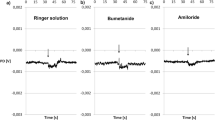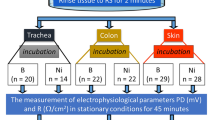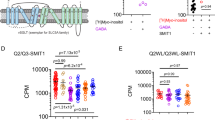Abstract
ALTHOUGH it is well established that isolated frog skin uses energy for the active transport of sodium, little is known about the metabolic processes providing this energy. Huf1 showed that monobromacetate caused a decrease in potential across the frog skin which could be reversed by pyruvic and lactic acids, but not by glucose. Similar results were obtained by Francis and Gatty2.
This is a preview of subscription content, access via your institution
Access options
Subscribe to this journal
Receive 51 print issues and online access
$199.00 per year
only $3.90 per issue
Buy this article
- Purchase on Springer Link
- Instant access to full article PDF
Prices may be subject to local taxes which are calculated during checkout
Similar content being viewed by others
References
Huf, E., Pflüg. Arch. ges. Physiol., 235, 655 (1935).
Francis, W. L., and Gatty, O., Exp. Biol., 15, 132 (1938).
Ussing, H. H., and Zerahn, K., Acta Physiol. Scand., 23, 110 (1951).
Zerahn, K., Acta Physiol. Scand., 36, 300 (1956).
Leaf, A., and Renshaw, A., Biochem. J., 65, 82 (1957).
Author information
Authors and Affiliations
Rights and permissions
About this article
Cite this article
BRUGGEN, J., ZERAHN, K. Active Transport of Sodium by Isolated Frog Skin in Relation to Metabolism of Acetate labelled with Carbon-14. Nature 188, 499–500 (1960). https://doi.org/10.1038/188499a0
Issue Date:
DOI: https://doi.org/10.1038/188499a0
This article is cited by
Comments
By submitting a comment you agree to abide by our Terms and Community Guidelines. If you find something abusive or that does not comply with our terms or guidelines please flag it as inappropriate.



